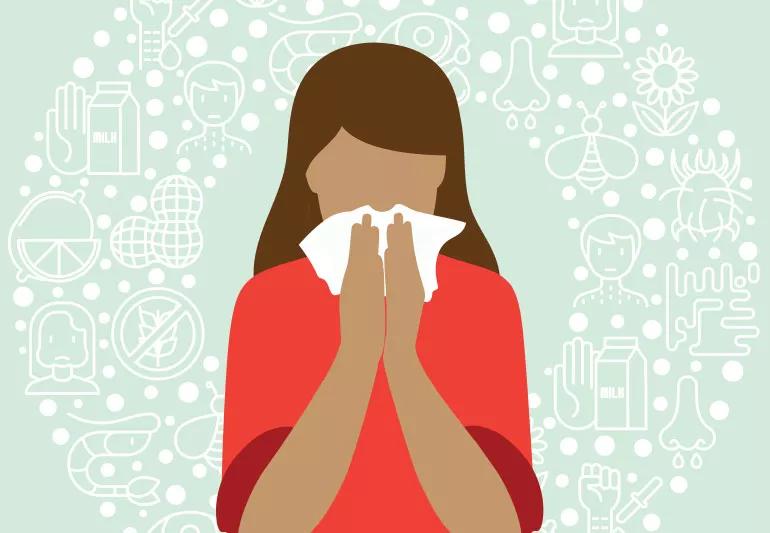Kits can prompt more questions than answers

Image content: This image is available to view online.
View image online (https://assets.clevelandclinic.org/transform/29ef3cf1-e437-41c9-a72b-b4e763ffadd4/allergies-1135349100-770x533-1_jpg)
woman with allergies
If you deal with allergies, you know it’s not always easy to figure out what’s causing an adverse reaction. But is a home allergy test the best way to pin that down?
Advertisement
Cleveland Clinic is a non-profit academic medical center. Advertising on our site helps support our mission. We do not endorse non-Cleveland Clinic products or services. Policy
Probably not, says allergist/immunologist Lily Pien, MD, MHPE.
Millions of Americans wrestle with allergies based on the season, exposure to pets or dust, or specific foods. Treatment depends on how severe your symptoms are and which allergy triggers (allergens) are involved.
Dr. Pien explains three main reasons why home allergy tests are not the best tool for pinpointing your problem.
“A true allergy is defined as experiencing allergic symptoms after exposure to a known allergen,” Dr. Pien says. Either a skin test or a blood test can help to pinpoint the cause by looking for specific immunoglobulin E (IgE) antibodies.
What home allergy kits test for isn’t always clear. For example, some kits don’t test for specific IgE antibodies, so their results may not reflect an actual allergy.
Some home tests may measure immunoglobulin G (IgG) antibodies instead of IgE antibodies to foods. “This type of testing does not reveal a true food allergy. It may cause significant harm by forcing people to avoid foods, making them believe they are allergic to several foods when they aren’t,” she says.
In addition, some home allergy tests may have you send in a hair sample instead of a blood sample. “Because there is no IgE in hair, results are not going to reflect a true food allergy,” Dr. Pien says.
Advertisement
If you notice that a certain food bothers you, you may assume you’re allergic to it. But there’s a big difference between food allergies and intolerance:
“If you want to know whether you have IgE-mediated food allergies, you need to have a skin test or blood test measuring specific IgE response to that food,” Dr. Pien advises. Food challenges are sometimes performed to help with the diagnosis.
And, when it comes to environmental factors such as pollen or dust, you may believe you have an allergy because your eyes are red and itchy. But you could have an eye infection.
The treatments are different for allergies and infections. “You may end up treating an incorrect diagnosis or the wrong thing unless you work with your doctor to find out exactly what’s causing your eye problems or other symptoms you’re having,” she says.
If you use a home allergy test, understanding the results can be difficult. Your doctor can help and should be involved. “Medical tests are best interpreted by consulting a healthcare provider,” Dr. Pien says.
That means you’ll need to see your doctor and may have to have additional tests done at the doctor’s office.
Even if your home test identifies a true allergen, it’s best to work with your doctor to treat your allergy.
If you decide to proceed with home testing, ask your doctor’s advice about specific products before your spend your money, Dr. Pien says.
Ultimately, you’ll get the best results and treatment advice from a board-certified or board-eligible allergist. “They will know which tests are appropriate for you, and will accurately interpret the results,” she says.
Advertisement

Sign up for our Health Essentials emails for expert guidance on nutrition, fitness, sleep, skin care and more.
Learn more about our editorial process.
Advertisement
OTC meds, rest, fluids and an anti-inflammatory diet can help you get through big and small weather changes
Honey, humidity and the right OTC meds can help bring on cough relief
Allergies, postnasal drip, asthma or reflux could be to blame for a cough that won’t quit
Correct positioning is one of the keys to getting the best results
Pink eye tends to start in one eye before spreading to the other, while allergies usually affect both eyes at the same time
Most antihistamines, like Zyrtec, are OK, but avoid decongestants for at least the first trimester
Allergies, indigestion and the effects of gravity can all mess with your nose at night
Open the windows, keep a clean house and consider putting in preventive features like carbon monoxide detectors
Although it could be used as a moisturizer, this new trend is not recommended
Communicating clear limits helps protect your time, energy and emotional well-being
High cholesterol can be genetic, but testing and treatment can lower your heart disease risk